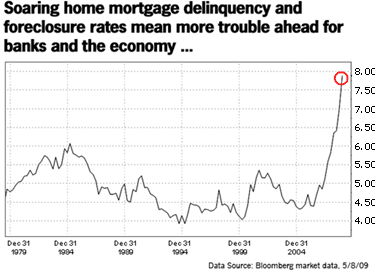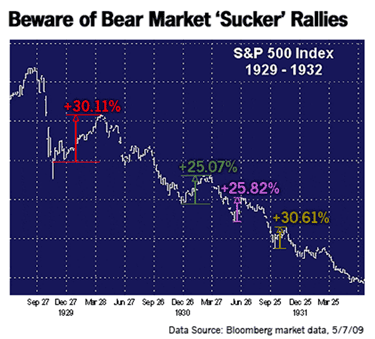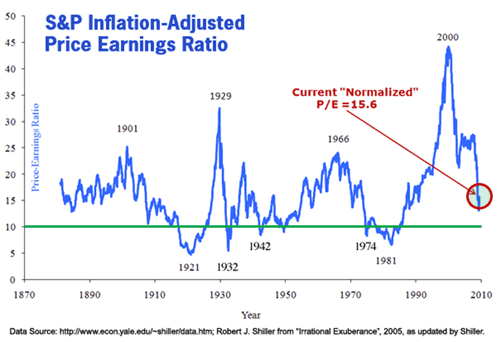Stock Market is 50% Over Valued, Bear Market is Not Over!
Stock-Markets / Stock Market Valuations May 18, 2009 - 07:28 PM GMT Sharon A. Daniels writes: The stock market has managed to claw its way higher since early March, despite some of the worst headlines since this financial crisis began.
Sharon A. Daniels writes: The stock market has managed to claw its way higher since early March, despite some of the worst headlines since this financial crisis began.
Suddenly, “green shoots” are springing up everywhere, but they can just as easily turn into wilting weeds again this summer, as I’ll show you in just a moment.
The market rally, over the past nine straight weeks, has left many investors frustrated and bewildered. Our message of caution: In the end, you may be pleased that you remained on the sidelines and didn’t jump into what we view as just another bear market bounce.
While this was unfolding, our investment professionals at Weiss Capital Management† were scratching our heads, wondering what on earth investors were thinking. While it’s true that SOME recent data on the economy has improved slightly (by PLUNGING less than expected) the reality is that it’s still a pretty bleak picture … at best!
Let’s take a look at the cold, hard facts … and these are just a few of the sobering headlines that have come to light while stocks rallied:
Fact #1 10 Major U.S. Banks FLUNK Stress Test:
The government did everything it could to lower the bar so banks could step over the stress-test hurdle. Even so, 10 of America’s largest banks STILL came up short and must raise the $75 billion in capital they desperately need to survive this crisis.1
Since more than 550 U.S. banks have already received nearly $200 BILLION 2 in government hand outs, I guess another $75 billion is only considered pocket change at this point …
Fact #2 U.S. Economy Shrinks Most in FIVE Decades:
 |
The economy sank at an annual rate of -6.1 percent in the first three months of 2009 … after plunging -6.3 percent the previous quarter — that’s the WORST back-to-back contraction in 50 YEARS. Economists now warn of a deepening recession due to a financial crisis that is “vastly worse” even than the 1930s!3
These back-to-back GDP declines of -6 percent annually are not only the worst in decades … they’re also worse than the worst-case scenario used in government stress tests, which forecast a -3.3 percent annual GDP decline this year.4 The current contraction is already twice as bad …
Fact #3 One-in-Five Homeowners UNDERWATER: U.S. home prices are still plunging — down nearly -27 percent from their peak in 2006.5 Even worse, a record 5.4 million Americans are delinquent on their mortgage loans — or already in foreclosure. Take a walk through your neighborhood this evening and take a good look at the homes you pass — based on this statistic ONE in FIVE of your neighbors could already be UNDERWATER!6
What’s more, 20 MILLION Americans nationwide now OWE more on their mortgage loans than their homes are WORTH, which doesn’t inspire much confidence that housing will stabilize any time soon.
Anyone who still thinks the worst is over and recent “green shoots” in the economy will lead to sustainable recovery soon, may want to think again!
Just Another Sucker’s Rally?
Don’t let Wall Street pundits brain wash you into believing the economy is on track for a swift and robust rebound … or that markets are reacting by forming the much anticipated “V-shaped” recovery pattern.
Of course, it’s true that stocks often lead the economy out of recession.
 |
And, considering the significant -38 percent sell off in the S&P 500 last year, it’s not surprising to see stocks bounce 20 percent to 30 percent.
But suggesting this rebound rally is a new bull market for stocks just doesn’t square with the facts of this economy … not in my book, anyway.
Keep in mind that during America’s first Great Depression, stocks staged rallies of +25 percent to +30 percent on four different occasions, but with each rally attempt coming from a lower level, while the overall market trend continued to spiral downward.7
This is the historical pattern of the long-term secular bear markets of the past and it’s what we anticipate for this one as well.
How to Prepare for a Secular Bear
Most investors today only know about the Great Depression from the dusty pages of history books — myself included. But those of us old enough to remember recall a long period when stocks went nowhere. In fact, the 1930s and early 40s was one, long secular bear market.
In fact, stocks didn’t break above their 1929 highs again until 1954 — a quarter century later! By that point, most investors had given up on ever owning common stocks again.8
Most of us today DO remember another secular bear market in U.S. stocks that began in 1966 and didn’t finally bottom (adjusted for inflation) until 1982 — 18 years later!9
Skyrocketing inflation rates were the big threat then, rather than deflation, which was the case in the 1930s. Now we’re again battling deflation, but in the not too distant future inflation … or even stagflation … could once again rob investors of purchasing power.
The fundamental lesson is clear: Secular bear markets have a tendency to last a very LONG time.
Now, fast-forward to the present, and we can see the S&P 500 Index has been locked in another secular bear market since it peaked in 2000. Adjusted for inflation, stocks have plunged -58 percent in the nine years since then. History shows us that secular bear markets take a long time to play out — and 15 to 20 years is not uncommon.10
As in the 1930s and 40s, OR the 1960s and 70s, these periods can be lengthy. Right now, we are in the ninth year of the current secular bear market, and the truth is, using the past as a guide, this secular bear may be only half-over.
This is especially true when you consider current market valuations …
Long-Term Trend Says S&P STILL 50 Percent Overpriced
Let’s take a closer look at stock market valuation using the price-to-earnings ratio (P/E) …
Back in October and November, as the market plunge was unfolding, the S&P 500 Index looked relatively cheap based on projected earnings over the next 12 months. At that time, the market’s “forward” P/E ratio fell to just 11 — well below the average P/E of 15 over the past 25 years.11
What you must understand is that stock prices collapsed first, but earnings had not yet adjusted downward to reflect worsening economic conditions.
So, when corporate profits then plunged, the “E” in the P/E ratio collapsed. Stocks, of course, tumbled further. But even now, after this latest rally, the market’s forward P/E has bounced back up to about 14.5. That’s just about average, but certainly not cheap.12
Another approach is to measure valuations over a longer period, this helps smooth out the ups and downs of the business cycle.
Yale professor Robert Shiller looks at a 10-year trend in “normalized” earnings for the S&P 500 Index, after adjusting for inflation. In March, his normalized P/E ratio fell to 13, its lowest level since 1986!13 But wait, that still isn’t dirt-cheap.
That’s because, at the end of previous secular bear markets in the 1940s, 1970s, and early 1980s (see graph below) the normalized P/E ratio frequently fell below 10 … sometimes even lower.

After the market’s nine-week rebound rally, the normalized P/E ratio is back up to 15.6 today … that’s close to its historical average, but again it’s certainly not cheap …14
Now, let me play devil’s advocate, let’s say that S&P 500 earnings remain stable … a generous assumption given the way corporate profits have plunged recently. Then, let’s assume we do reach a normalized P/E ratio of 10 during this secular bear market, as we have in the past.
If that’s the case, then the S&P 500 would still need to fall by more than ONE-THIRD. And it could get even worse …
If long term valuations revert back to the low P/E ratios reached at the end of the LAST secular bear market in the early 1980s (normalized P/E of about 8) … that means the S&P 500 could, conceivably, FALL another 50 percent in value from here!15
Don’t get me wrong: I’m not predicting stocks WILL fall that much during this secular bear market … but it is a possibility. After all, it HAS happened several times before. As an investor, you need to prepare yourself and your portfolio for this possibility. If you’re a speculator or a trader, then you could be looking at some significant profit opportunities on both sides of this market.
The bottom line: In the midst of an epic financial crisis and secular bear market, as we have today, don’t ignore the lessons of the past.
Hope for the Best, but Prepare for the Worst
At Weiss Capital Management, we believe the recent rally has been based more on relief, rather than any tangible evidence of true recovery.
Sure, many investors were cheered that recent economic news turned “less bad” … at least for a while. Institutional investors fueled the rally by covering short sales, and closing out some of their hedge positions.
But folks, this is the stuff of a bear-market bounce … not the stuff of a sustained bull market advance. Tread cautiously.
Don’t lose sight of the severity of this economic crisis. The recession is currently in its 17th month. Already, it’s the longest recession since WWII — even worse than the previous record holders — the recessions in 1973-75, and 1981-82.16
It’s also likely to be the worst contraction in terms of magnitude that anyone under the age of 80 has ever experienced in their lifetime.
Forecasts call for the U.S. economy to contract -3.5 percent for all of 2009 … and GDP already fell at an annual rate of -6.1 percent last quarter alone! The previous record decline was -1.9 percent in 1982.17
So, let’s ask ourselves a basic question: If the economy TODAY already appears WORSE than in the 1970s and early 80s (perhaps much worse) … and if stocks back then fell to single-digit P/E ratios … then why should we think it couldn’t happen again this time?
Your motto during a secular bear market should be this: “Hope for the best, but prepare for the worst” … just in case.Understand what the REAL worst-case scenario could mean for your investments … then hope it never happens.
At Weiss Capital Management, we can offer you a number of professionally managed strategies designed for both conservative investors and aggressive traders. Depending on your objectives and time horizon, we can advise you on which of these strategies may be the best fit for you.
Whether you are looking to take advantage of bear market rallies by targeting short-term gains in certain sectors, or whether you’re looking to protect or hedge your portfolio from more difficult conditions ahead … we can offer you solutions.
In sum, Weiss Capital Management offers investment options for both UP and DOWN markets. While we hope for the best outcome for our economy and financial markets, we also believe in preparing for the worst, just in case.
A final word of caution: Risks are still running very high, and these markets can be difficult to navigate on your own. But we’re here to help you invest with confidence, just as we did in the last bear market.
There’s never been a better time to seek the guidance of experienced investment professionals, to help make sure your wealth is protected, and your investments stay on the right track to achieve your financial goals. If you have an investment portfolio of $250,000 or more, we can provide you with a personal financial STRESS TEST for your portfolio.*
We will carefully review your current holdings line-by-line … one security at a time … with an eye toward reducing your risk and positioning you to take advantage of new opportunities ahead. There is absolutely NO CHARGE for this portfolio evaluation and no further obligation.
Just use this link to request your complimentary portfolio evaluation. We will contact you promptly for your personal one-on-one consultation, including a complete review of your current investments … and it won’t cost you a penny.
I invite you to STRESS TEST your portfolio with Weiss Capital Management right away.
With warm regards,
Sharon A. Daniels President Weiss Capital Management, Inc.
* You must be a U.S. citizen or legal resident to qualify for a complimentary portfolio review.
†Weiss Capital Management (an SEC-Registered Investment Adviser) is a separate but affiliated entity of Weiss Research, the publisher of Money and Markets. Both entities are owned by Weiss Group, LLC.
The preceding is a paid for editorial that may contain forward-looking statements regarding intent and belief with regard to Weiss managed strategies and the market in general. Readers are cautioned that actual results may differ materially from those statements.
1 Bloomberg: “U.S. Stress Test Capital Requirement Results Summary,” 5/8/09
2 Wall Street Journal: “Participants in Government Investment Plan,” 4/22/09
3 Wall Street Journal: “Participants in Government Investment Plan,” 4/22/09
4 Federal Reserve: 4/24/09
5 Standard & Poor’s press release: 2/24/09
6 Wall Street Journal: “House-Price Drops Leave More Underwater,” 5/6/09
7 Bloomberg market data: 5/7/09
8 Bloomberg market data: 5/13/09
9 Merrill Lynch: “Closing the book with an open mind,” 5/4/09
10 Ibid
11 Wall Street Journal: “By Most Measures, Stocks No longer Look Cheap,” 5/11/09
12 Ibid
13 Ibid
14 Ibid
15 Data from “Irrational Exuberance,” Princeton University Press, 2005, as updated by Robert J. Shiller
16 Northern Trust: U.S. Economic & Interest Rate Outlook, 4/21/09
17 Northern Trust: Daily Global Commentary, 4/29/09
This investment news is brought to you by Money and Markets . Money and Markets is a free daily investment newsletter from Martin D. Weiss and Weiss Research analysts offering the latest investing news and financial insights for the stock market, including tips and advice on investing in gold, energy and oil. Dr. Weiss is a leader in the fields of investing, interest rates, financial safety and economic forecasting. To view archives or subscribe, visit http://www.moneyandmarkets.com .
Money and Markets Archive |
© 2005-2022 http://www.MarketOracle.co.uk - The Market Oracle is a FREE Daily Financial Markets Analysis & Forecasting online publication.



